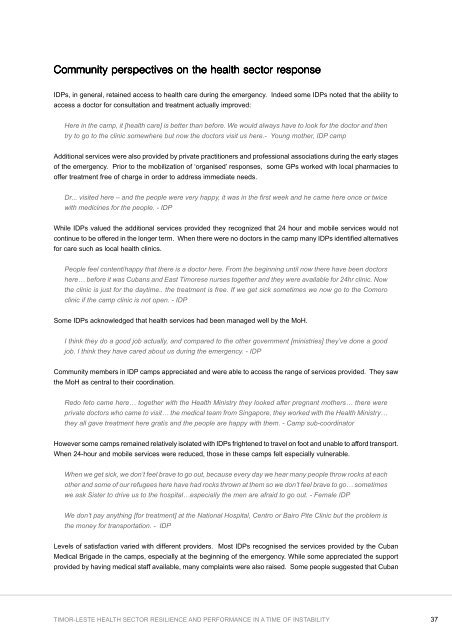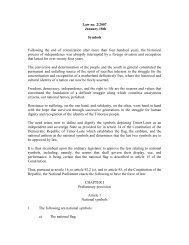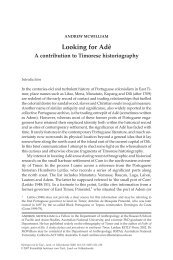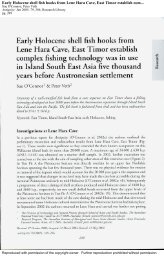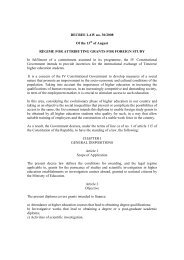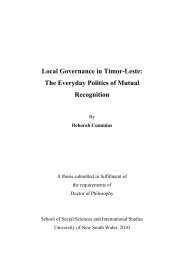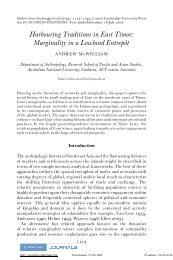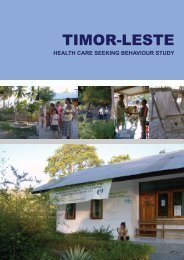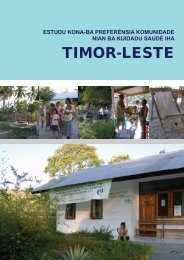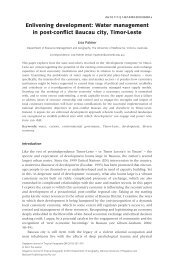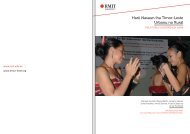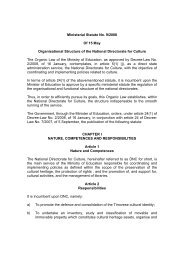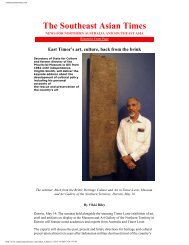Timor-Leste. Health Sector Resilience and Performance in a Time of ...
Timor-Leste. Health Sector Resilience and Performance in a Time of ...
Timor-Leste. Health Sector Resilience and Performance in a Time of ...
- No tags were found...
You also want an ePaper? Increase the reach of your titles
YUMPU automatically turns print PDFs into web optimized ePapers that Google loves.
Community perspectives on the health sector responseIDPs, <strong>in</strong> general, reta<strong>in</strong>ed access to health care dur<strong>in</strong>g the emergency. Indeed some IDPs noted that the ability toaccess a doctor for consultation <strong>and</strong> treatment actually improved:Here <strong>in</strong> the camp, it [health care] is better than before. We would always have to look for the doctor <strong>and</strong> thentry to go to the cl<strong>in</strong>ic somewhere but now the doctors visit us here.- Young mother, IDP campAdditional services were also provided by private practitioners <strong>and</strong> pr<strong>of</strong>essional associations dur<strong>in</strong>g the early stages<strong>of</strong> the emergency. Prior to the mobilization <strong>of</strong> ‘organised’ responses, some GPs worked with local pharmacies to<strong>of</strong>fer treatment free <strong>of</strong> charge <strong>in</strong> order to address immediate needs.Dr... visited here – <strong>and</strong> the people were very happy, it was <strong>in</strong> the first week <strong>and</strong> he came here once or twicewith medic<strong>in</strong>es for the people. - IDPWhile IDPs valued the additional services provided they recognized that 24 hour <strong>and</strong> mobile services would notcont<strong>in</strong>ue to be <strong>of</strong>fered <strong>in</strong> the longer term. When there were no doctors <strong>in</strong> the camp many IDPs identified alternativesfor care such as local health cl<strong>in</strong>ics.People feel content/happy that there is a doctor here. From the beg<strong>in</strong>n<strong>in</strong>g until now there have been doctorshere… before it was Cubans <strong>and</strong> East <strong>Timor</strong>ese nurses together <strong>and</strong> they were available for 24hr cl<strong>in</strong>ic. Nowthe cl<strong>in</strong>ic is just for the daytime.. the treatment is free. If we get sick sometimes we now go to the Comorocl<strong>in</strong>ic if the camp cl<strong>in</strong>ic is not open. - IDPSome IDPs acknowledged that health services had been managed well by the MoH.I th<strong>in</strong>k they do a good job actually, <strong>and</strong> compared to the other government [m<strong>in</strong>istries] they’ve done a goodjob. I th<strong>in</strong>k they have cared about us dur<strong>in</strong>g the emergency. - IDPCommunity members <strong>in</strong> IDP camps appreciated <strong>and</strong> were able to access the range <strong>of</strong> services provided. They sawthe MoH as central to their coord<strong>in</strong>ation.Redo feto came here… together with the <strong>Health</strong> M<strong>in</strong>istry they looked after pregnant mothers… there wereprivate doctors who came to visit… the medical team from S<strong>in</strong>gapore, they worked with the <strong>Health</strong> M<strong>in</strong>istry…they all gave treatment here gratis <strong>and</strong> the people are happy with them. - Camp sub-coord<strong>in</strong>atorHowever some camps rema<strong>in</strong>ed relatively isolated with IDPs frightened to travel on foot <strong>and</strong> unable to afford transport.When 24-hour <strong>and</strong> mobile services were reduced, those <strong>in</strong> these camps felt especially vulnerable.When we get sick, we don’t feel brave to go out, because every day we hear many people throw rocks at eachother <strong>and</strong> some <strong>of</strong> our refugees here have had rocks thrown at them so we don’t feel brave to go… sometimeswe ask Sister to drive us to the hospital…especially the men are afraid to go out. - Female IDPWe don’t pay anyth<strong>in</strong>g [for treatment] at the National Hospital, Centro or Bairo Pite Cl<strong>in</strong>ic but the problem isthe money for transportation. - IDPLevels <strong>of</strong> satisfaction varied with different providers. Most IDPs recognised the services provided by the CubanMedical Brigade <strong>in</strong> the camps, especially at the beg<strong>in</strong>n<strong>in</strong>g <strong>of</strong> the emergency. While some appreciated the supportprovided by hav<strong>in</strong>g medical staff available, many compla<strong>in</strong>ts were also raised. Some people suggested that CubanTIMOR-LESTE HEALTH SECTOR RESILIENCE AND PERFORMANCE IN A TIME OF INSTABILITY 37


